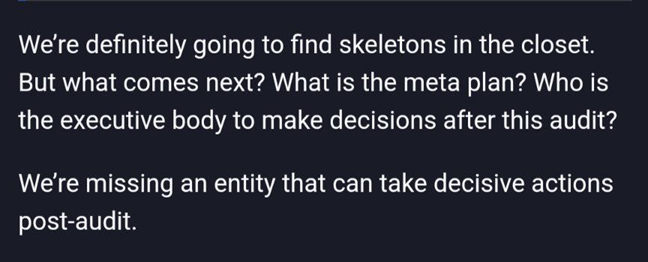Legacy crypto foundations are in focus lately--with many realizing how much power they wield yet how opaque and unaccountable they are.
For example, one of the most controversial proposals in Cosmos history is going on right now--a vote of no-confidence in Cosmos' main foundation entity, the ICF. Parts of Cosmos community are facing off against the ICF, alleging they squandered funds, mismanaged operations, and let down the developers who made the chain what it is.
Here's what you need to know about the conflict and an analysis of possible steps they can take moving forward:
👇🧵
—
Recently the signaling proposal “Declaration of NO CONFIDENCE in the ICF Leadership & Request for Comprehensive Audit” dropped, accusing the Interchain foundation of corruption, mismanagement, opaque operations, and conflicts of interest.
The Interchain Foundation (ICF) is the main foundation supporting the Cosmos ecosystem, having absorbed 10% of the entire genesis ATOM supply at launch under the promise that they would transparently support the network, protocol, and community in a similar way to the Ethereum Foundation does with Ethereum.
However this allegedly didn’t happen, with accusations of everything from mismanagement to corruption to backroom deals tainting the perception of the ICF and, by extension, Cosmos as a whole.
Builders and Devs are raising concerns about the structure and actions of the org, with some leaving completely for competitors such as Celestia.
https://x.com/Rarma_/status/1808993355340394639
So what can be done to fix this? Here’s some things we think the community should consider:
—
The Myth of Non-Profits and the Problem of Transparency
Despite common misconceptions, on their own non-profits are just companies who don’t directly generate profit for their owners. However they have the same corruptible, bureaucratic, and opaque elements that their for-profit corporate cousins do (and sometimes moreso).
Nothing in a regular non-profit organization binds them to have to work for the common good of a project or have to answer to their community or users (only the obligated tax reporting and limited audits are required, depending on their location).
This is compounded in crypto orgs where information asymmetry is potentially highly profitable, thus incentivizing even more corruption or opaque maneuvers.
—
Audits are not enough.
Another myth is that auditing on its own is enough to provide transparency and accountability to orgs, but the truth is that other than what is legally required, which usually isn’t much, a non-profit isn’t bound to have to do comprehensive audits or submit to external auditors.
This means that the audits the Cosmos community is reasonably demanding in the signaling proposal likely couldn’t be enforced, and if the foundation is as dysfunctional as alleged, the community would just have to trust it without being able to verify what’s being reported is accurate.
This isn’t to completely discard the idea of a non-profit organization or audits, they’re vital to any project or movement, but they’re incomplete without these assurances:
—
The 3 Assurances.
There is a fundamental tension between communities and legal orgs that can't be rectified without three types of assurances:
—
1. Legal Assurances On their own, non-profits are nowhere near enough to assure
Relying strictly on jurisdiction isn’t enough. An entity needs to be created that is engineered from the ground up to be as limited and restricted as possible. This means separating powers, responsibilities, and resources in a transparent manner and making all roles and responsibilities known.
—
2. On-Chain Assurances
One of the most powerful aspects of crypto is that it lets you have cryptographically assured transparency where anyone can see where the funds go and who’s is using them The main limitation of this is knowing what happens to the off-chain and if the funds are being used for what they’re supposed to be. Things like payment streams, escrows, and wages need to be tracked on chain and included in reports and audits as they would any other fund type.
—
3. Cybernetic Assurances This is where the two other assurances fuse into something special.
A cybernetic assurance is one where technology constrains the action of the foundation or BORG, meaning that rugging isn't possible in the first place rather than trying to construct a purely legal structure to try to constrain corruption.
https://x.com/MetaLeX_Labs/status/1771574413554524453
This solves the huge trust issue when it comes to entity-community trust because it allows every term and rule controlling funds to be fully onchain, without a third party needed at all and restricts the ability for the BORG to receive funds in the first place.
https://x.com/LeXscroW/status/1824133737111753095
For example, you can make a BORG that only can interact with the funds that a DAO releases from the LeXscroW vault as subject to the terms of the bylaws of the BORG, while also letting the DAO legally sue if the BORG mishandles the funds in any way. Or essentially--no responsibility, no funding.
—
Creating a BORG, rather than another version of a foundation, would force the BORG to be fully transparent rather than relying on either the government or foundation to enforce their transparency and provide accurate information and reports.
However any cybernetic agreement is better than just hoping that the status quo magically improves or that a jurisdiction change will save the day. We believe trusting in code + humans is better than leaving the hard stuff to only either.
----------------------
If you liked this analysis, you'll want to read this analysis we did on the Compound governance disaster that we just posted:
https://x.com/MetaLeX_Labs/status/1823431143338745861
Also check out @lex_node 's thoughts on the Ethereum Foundation and how more BORG-like features could reduce trust assumptions there:
https://x.com/lex_node/status/1827276593477066884
If you want to learn more about BORGs read our whitepaper here:
https://x.com/MetaLeX_Labs/status/1767194511875174623
Assimilate today at
🖖









